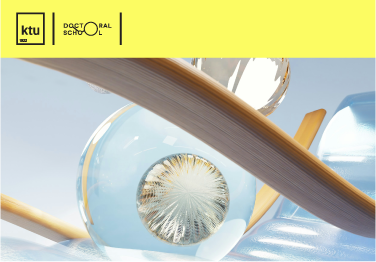Dr. Jonė Vitkauskaitė-Ramanauskienė is the winner of the BUP PhD Award 2025 in the research area of Social Sciences and Humanities for the most qualified PhD work .
Doctoral student Šarūnė Daškevičiūtė (Chemistry science field) was awarded L’Oréal Baltic For Women in Science Fellowship in 2024.
Doctoral student Aida Drevilkauskaitė (Chemistry science field) was awarded L’Oréal Baltic For Women in Science Fellowship in 2023.
Doctoral student Tomas Klinavičius won the “Young Scientist Award” twice in 2020 and 2021 at the international conference-school “Advanced Materials and Technologies”.
“Deposition of Ag Nanocubes into Regular Arrays by Tailored Self-Assembly” by doctoral student Mindaugas Juodėnas (Materials engineering), was recognised as one of the best works in the 19th international conference-school “Advanced Materials and Technologies 2017”.
LMA prize of 2016 is awarded to the winners of the competition of the works of young scientists and doctoral students dr. Oksana Palekienė (Economics) and dr. Tadas Prasauskas (Environmental engineering).
Dr. Živilė Stankevičiūtė (Management) “Sustainability dimension in the organisation’s human resource management” was recognised as the best dissertation of 2015 by the programme of the Baltic Universities.
Doctoral student Vykintas Samaitis (Electrical and electronic engineering) was awarded a prestigious scholarship by the Acoustical Society of America for the results of his research activities.
Doctoral students Donatas Miklušis (Electrical and electronic engineering), Nora Šlekienė (Chemical Engineering), Vytautas Bakanauskas (Mechanical engineering), Shanker Ganesh Krishnamoorthy (Mechanical engineering) were awarded a scientific traineeship at the European Space Agency.
Doctoral student of KTU Institute of Materials Science Tadas Juknius (Materials Engineering) created a smart bandage with silver nanoparticles and pH indicator. Patent application on behalf of KTU, submitted in 2016, is being successfully commercialised under the invention licencing agreement with UAB “Addere” on 15 September 2016.
The catheters with antimicrobial properties and antimicrobial silicone covers, the invention of doctoral student Aistė Lisauskaitė (Materials engineering) and her supervisor Professor Virginija Jankauskaitė, have gained international acclaim.







Social Sciences
Social Sciences
S002 Political Sciences
Joint PhD studies with Vytautas Magnus University, Klaipėda University and General Jonas Žemaitis Military Academy of Lithuania
Doctoral programme is provided in the field of public policy and administration. Joint programme offers dissertation topics in theory of politics, political communication, comparative politics and international relations. During doctoral studies the students are developing their individual research skills, creativity, they expand their theoretical knowledge and practical experience by solving the chosen research problems. Political Sciences doctoral study programme aims at training researchers and scientists in the field of public policy.
S003 Management
The Doctoral Programme in Management is aimed at young researchers interested in management and business challenges. Research topics include the digital transformation of organisations, the added value of artificial intelligence, the management of knowledge and intellectual capital, the characteristics of sustainable management and the circular economy, neuromarketing, consumer behaviour, the development of innovations and the rapid growth of start-ups, especially technological start-ups. By working in research groups, KTU Management PhD students have the opportunity to deepen their knowledge of contemporary management and business theories, study the performance of organisations and ecosystems, and develop and apply knowledge and innovations in the field of management and business administration in practice.
The KTU PhD in Management stands out for its ability to adapt to constantly changing global trends, such as technological advances and challenges posed by artificial intelligence, financial crises, social and political changes, and environmental and climate change challenges. KTU management scholars are recognised in the fields of innovation and entrepreneurship, neuromarketing, Industry 4.0, digital health innovation, digital society, sustainable management, consumer behaviour and circular economy. KTU Management PhD students conduct research on challenges at the intersection of the individual and the organisation, and technology and society. By acquiring and developing specialised research skills in their chosen area of expertise, doctoral students can develop a holistic understanding and interdisciplinary insight to connect management practice with organisational theory.
S004 Economics
Joint PhD studies with Klaipėda University and Lithuanian Energy Institute.
The KTU PhD in Economics is designed for those interested in advanced research in the field of economics, which examines the principles of economic systems, decision-making processes and resource allocation in society and the economy. During their studies, PhD students explore economic theories, apply them to real-life situations and develop new knowledge, thus contributing to the development of modern economics.
KTU’s doctoral programme in Economics is characterised by its orientation towards advanced and interdisciplinary research, which enables the study of economic processes in their social, political and technological contexts. It is a unique approach that not only deepens knowledge of economic theories but also incorporates innovative methods such as data analysis and artificial intelligence. The PhD focuses not only on macroeconomics but also on economic challenges in smaller, local contexts, such as economic transformation, social responsibility and sustainability.
S005 Sociology
Joint PhD studies with Vytautas Magnus University and Lithuanian Social Research Centre
Doctoral studies in Sociology are provided at Kaunas University of Technology in cooperation with Vytautas Magnus University and Lithuanian Social Research Centre. Doctoral students develop their individual scientific skills, creativity, expand theoretical knowledge and practical experience.
S007 Education
Joint PhD studies with the Lithuanian Sports University and Vilnius University
Doctoral studies in the field of Education analyse the subjects of formal, non-formal and informal education and learning of young generation and adults, social development, education management, higher education, as well as the issues of modern educational technologies, education and learning environments, and educational innovations. Research is conducted in the juncture of education and other social sciences, aiming to meet educational challenges of the organisational learning in knowledge organisations, development of learning in partnership networks, and learning cities and regions.